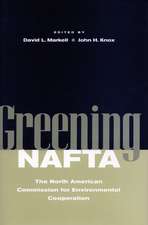Sweet Talk: Paternalism and Collective Action in North-South Trade Relations: EMERGING FRONTIERS IN THE GLOBAL ECONOMY
Autor J. P. Singhen Limba Engleză Paperback – 10 ian 2017
While urging developing countries to participate in trade, the North offers empty deals to "partners" that it regards as unequal. Using a mixed-methods approach, J. P. Singh exposes the actual position beneath the North's image of benevolence and empathy: either join in the type of trade that developed countries offer, or be cast aside as obstreperous and unwilling. Singh reveals how the global North ultimately bars developing nations from flourishing. His findings chart a path forward, showing that developing nations can garner favorable concessions by drawing on unique strengths and through collective advocacy. Sweet Talk offers a provocative rethinking of how far our international relations have come and how far we still have to go.
| Toate formatele și edițiile | Preț | Express |
|---|---|---|
| Paperback (1) | 225.49 lei 6-8 săpt. | |
| Stanford University Press – 10 ian 2017 | 225.49 lei 6-8 săpt. | |
| Hardback (1) | 702.75 lei 6-8 săpt. | |
| Stanford University Press – 10 ian 2017 | 702.75 lei 6-8 săpt. |
Preț: 225.49 lei
Nou
43.15€ • 46.86$ • 36.25£
Carte tipărită la comandă
Livrare economică 22 aprilie-06 mai
Specificații
ISBN-10: 1503601048
Pagini: 264
Dimensiuni: 152 x 229 x 18 mm
Greutate: 0.36 kg
Editura: Stanford University Press
Colecția Stanford University Press
Seria EMERGING FRONTIERS IN THE GLOBAL ECONOMY
Recenzii
Notă biografică
Descriere
Cuprins
This chapter describes the key linkages for the book: the way paternalistic strength weakens trade reciprocity and negotiation advantages strengthen it in North¿South trade negotiations. It describes the main counterfactual, strategic trade theory, and then provides a deeper explanation embedded in cultural preferences that account better for outcomes in trade negotiations.
This chapter first analyzes arguments in favor of, and against, interstate justice and paternalism¿the strong helping the weak¿before turning to the conditions in international negotiations that allow developing countries to obtain concessions in their favor. Paternalistic concessions are examined as departures from reciprocity to the extent that they are unilateral concessions made to the developing world, often in lieu of trade concessions that the developing world needs. Paternalistic preferences are traced back to racism. The chapter also explains the developing world's negotiation advantages.
This chapter shows that postcolonial questions were not paramount in the creation of GATT. It presents an analysis of trade measures that affected the developing world from the creation of the GATT to the end of the Tokyo Round (1979). Three trade measures are examined: the system of imperial preferences, trade status for infant industry in the developing world, and the Generalized System of Preferences that resulted in special and differential treatment for the developing world. The causal variables for examining the degree of reciprocity in each of these trade measure remain the same as before: North¿South trade negotiations and the degree of paternalism from the North.
This chapter attends to the dynamics of paternalism and negotiations at GATT's Uruguay Round (1986¿1994) and the effects on reciprocity in merchandise trade at the three levels of evidence from mixed methods presented in this book. First, the chapter attends to the presence of "sweet talk" as rhetoric. It provides the results of a content analysis of 1,925 pages of press releases for the 1982¿1993 period from the U.S. trade representative for the years of the Uruguay Round, which confirms paternalism in USTR discourse. Next, the chapter presents the overall findings on merchandise trade at the Uruguay Round with an index developed to measure paternalism from a factor analysis of three other indices. Finally, the textiles agreement from the Uruguay Round is examined as a case of North¿South negotiations in manufacturing.
This chapter analyzes the evidence against North¿South trade reciprocity at all levels discussed in this book: quantitative, historical, and case studies of sugar and cotton. Former colonies fare worse in agriculture than they did in manufacturing, even after the Uruguay Round, which ostensibly opened up some markets in agriculture. The Uruguay and Doha Rounds are discussed separately. Furthermore, a microanalysis of the causal factors¿paternalism and negotiation advocacy¿in the sugar and cotton cases helps to examine the underlying cultural intransigence that blocks benefits for the developing world.
This chapter explains the difference between the North¿South intellectual property and services agreements. The former is heavily contested, whereas the latter offers a win-win for North¿South negotiations. The North's coercion and paternalism in intellectual property is explained first. Any exceptions to TRIPS provisions have resulted from the developing world's advocacy. The services agreement has enabled many developing countries¿ranging from India as an outsourcing hub to developing country island states as tourism corridors¿"discover" their comparative advantage in services products. Along the way, the developing world has also been singled out in policy and media accounts in the United States and the EU for "stealing" high-tech jobs, and fairly explicit racism has been directed at countries like India targeting its outsourcing practices.
This chapter provides a summary of the lessons learned, attends to counterarguments, and conjectures on ways forward for the developing world. Contrary to the expectations from a benevolent paternalism, this book finds scant evidence of sustainable material benefits from paternalism in international trade relations. Negotiated alternatives, especially multilateral ones, provide the weak some advantage. Strategic collective action from the weak fares well, but strategic economic diversification translates best into negotiation advantages.



















